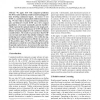Free Online Productivity Tools
i2Speak
i2Symbol
i2OCR
iTex2Img
iWeb2Print
iWeb2Shot
i2Type
iPdf2Split
iPdf2Merge
i2Bopomofo
i2Arabic
i2Style
i2Image
i2PDF
iLatex2Rtf
Sci2ools
143
click to vote
CEC
2005
IEEE
2005
IEEE
XCS with computed prediction in continuous multistep environments
We apply XCS with computed prediction (XCSF) to tackle multistep reinforcement learning problems involving continuous inputs. In essence we use XCSF as a method of generalized reinforcement learning. We show that in domains involving continuous inputs and delayed rewards XCSF can evolve compact populations of accurate maximally general classifiers which represent the optimal solution to the target problem. We compare the performance of XCSF with that of tabular Q-learning adapted to the continuous domains considered here. The results we present show that XCSF can converge much faster than tabular techniques while producing more compact solutions. Our results also suggest that when exploration is less effective in some areas of the problem space, XCSF can exploit effective generalizations to extend the evolved knowledge beyond the frequently explored areas. In contrast, in the same situations, the convergence speed of tabular Q-learning worsens.
Artificial Intelligence | CEC 2005 | Continuous Inputs | Reinforcement Learning | Reinforcement Learning Problems |
Related Content
| Added | 13 Oct 2010 |
| Updated | 13 Oct 2010 |
| Type | Conference |
| Year | 2005 |
| Where | CEC |
| Authors | Pier Luca Lanzi, Daniele Loiacono, Stewart W. Wilson, David E. Goldberg |
Comments (0)

